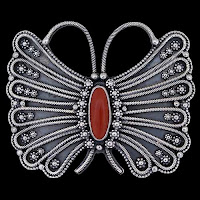
Southwest Jewelry
The man turned away from the telephone as he finished his entry and fixed his clear brown eyes on me. Facing me, he flashed a broad, brilliantly white, smile. The grin was accented by an electric blue pair of turquoise tabs tied to his ear lobes with cotton string. With a smooth, practiced motion, he raised his right hand, palm forward, and said "HOW!" I laughed out loud at his animated impression of a John Wayne western movie Indian. I heard his call connect as I replied Ya' 'at' eeh', which, as most locals know, is a Navajo greeting which means, "It is good". What I meant was, "That was a good one!" I think he understood, because he chuckled as I passed on by.
A few minutes later, as I exited the cafe with my hot drink, I noticed that same young man sitting on the juniper stump and sandstone bench next to the phone. He was dressed in a fatigued, button-down, long-sleeved denim shirt tied at the neck with a slightly used red bandanna; mostly new Wrangler jeans; and a pair of comfortably worn, swoop heel, riding boots. A black cowboy hat with just the right amount of wear was pulled down over his eyes. I thought to myself, "This guy has captured 'the look'". Stuffed under the bench was an army duffel bag with the name "Yazzie" printed in white block letters.
I walked back towards the man and the trading post, smiling to myself as I took in the character he had obviously created. At my approach he looked up from under the Stetson and said, "What's-up Kimosabe?" I laughed again at the good-natured remark and asked, "So, does that make you Tonto Yazzie?" "No!" he said, wrinkling his nose distastefully, then quickly flashing that Million-dollar Hollywood smile once again. "Rick Yazzie."
Rick stood up and extended his right hand. I extended my own hand to accept the gesture. He grasped my thumb, wrapped his hand around the back of mine, leaned in, gave me a shoulder bump and patted me on the back. "A man hug", I thought, "very personable".
"Rick," I said, "do you need a job? We need good good people around here, a guy like you would do well." Rick shook his head from side to side, eased back onto the bench and told me he had grander plans. "I'm heading "ober dere"," he said, pursing his lips and pointing them toward the western horizon. "Too bad." I said, laughing again at his use of Navajo/English slang, "You'd be a good one." "Thanks man," said Rick, "but I have to give it a try." I told him I understood and that we would be here if he changed his mind. Just then Priscilla stuck her head around the corner and announced that I had a phone call; our good friend Ed wanted to order a basket. I told her I would be right there.
As I turned to take the call, I told Rick he needed a nice turquoise necklace and a silver concho belt to finish off his outfit. He leaned up, flashed that engaging smile one last time and patted the duffel bag at his feet. With a twinkle in his eye he said; "It's in the bag man!" I should have known. As I spoke with Ed, I saw a big, black Dodge Ram pick-up roll to a stop between the cafe and trading post. I watched as Rick threw his duffel into the truck and climbed into the passenger seat. As the big rig pulled out of the parking lot, I thought to myself, Ha'goo'nee' Rick, good luck. Maybe we'll see you in the movies.
With Warm Regards,
Barry, Steve and the Team.
Copyright 2009 Twin Rocks Trading Post



